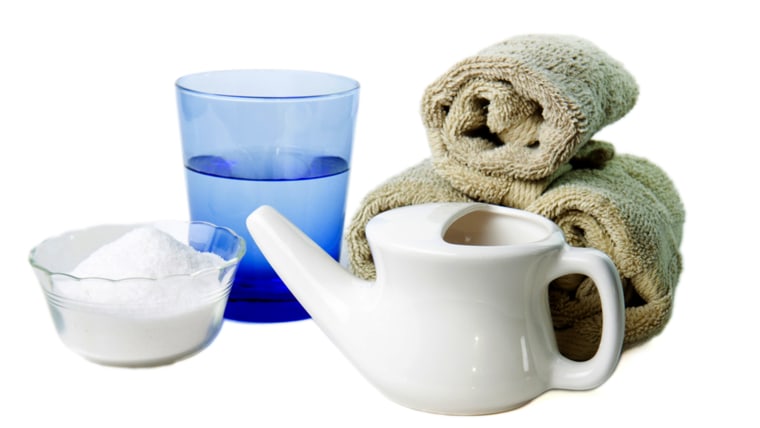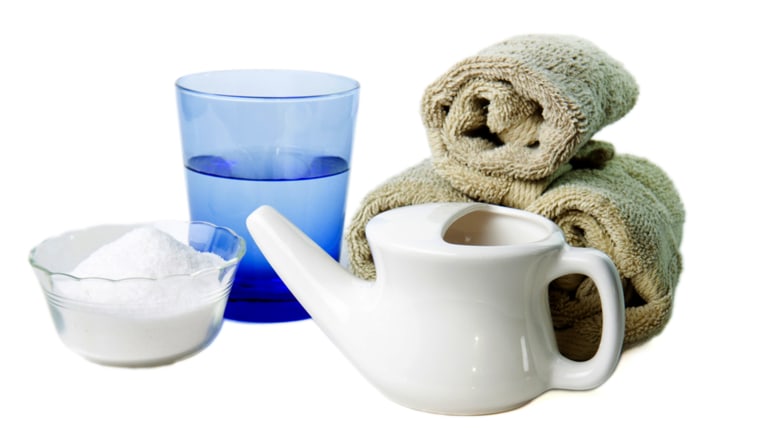Many people with colds, the flu or allergies swear by neti pots to flush away nasal congestion and banish post-nasal drip. But are these little teapot-shaped devices with an extra-long spout safe? And is it OK to flush your sinuses with saline solution every day?

For the most part, experts says, neti pots are safe — as long as you're careful to clean them regularly and use the right source of water in the saline solution.
For those who are unfamiliar with neti pots and nasal flushing, the concept is pretty simple. The spout is placed in one nostril and the head is tilted at about a 45 degree angle off of vertical, so the other nostril is lower. The pot is held high and the salty water flows in one nostril and out of the other, flushing debris out with it.
“The salt water helps loosen and flush out the mucus,” explains Dr. Amy Crawford-Faucher, an assistant clinical professor in the department of family medicine at the University of Pittsburgh Medical Center. “Because it also thins the mucus, it helps with post-nasal drip.”
Another advantage: salt has some antimicrobial properties, Crawford-Faucher says.
For first time users, the experience can be a bit off putting, Crawford-Faucher says. “It feels like jumping into the ocean without pinching your nose shut,” she explains.
But the relief is often so great that the initial discomfort is soon forgotten, says Dr. Marilene Wang, a professor in the department of head and neck surgery at the David Geffen School of Medicine at the University of California, Los Angeles, and the director of UCLA’s Nasal and Sinus Disease Center.
“The fluid is similar to what is in tears and it’s actually very soothing and cleansing to the sinuses,” Wang adds. “When you breathe air in in Los Angeles, it comes with a lot of particles. They land in the nose and irritate the tissue. People who have allergies have an overreaction and develop symptoms like thick sticky mucus, sneezing, and runny eyes. If you rinse out the irritants, you remove the trigger that incites the symptoms.”
There's been some controversy over nasal irrigation — one widely-publicized study in 2009 suggested daily use worsened acute sinus infections. But a 2012 analysis of 10 relevant studies by the National Institutes of Health found that nasal irrigation can be a "safe and inexpensive" form of treatment for upper respiratory symptoms. The NIH report didn't determine the optimal system (spray or douching with a pot or bulb) or type of saline solution, however.
For the most part the treatment is safe, experts say. The biggest issues are keeping the neti pot clean and making sure you use the right kind of water.
In fact, according to the Food and Drug Administration, the most important safety factor in nasal flushing is the water source. That’s because tainted tap water can be lethal. In fact, two deaths in Louisiana were traced to water in neti pots that had been contaminated with an amoeba called Naegleria fowleri, also known as the “brain-eating amoeba.”
That’s why it’s best to use distilled or boiled water in your neti pot, Crawford-Faucher says.
Still, she says, people shouldn’t be unduly frightened since this is a very rare happening.
“One of the blessings and curses of the Internet is that those two cases, which would probably never have seen the light of day before, now have taken on importance because we all know about it,” Crawford-Faucher says.
More likely is the possibility that bacteria or fungi can build up in the neti pot if you don’t keep it clean. So you want to wash it regularly and thoroughly, Crawford-Faucher says. And don't share it.
Wang goes a step further. To be on the safe side, she says, “I recommend changing the bottle or pot at least every month.”
Fighting flu: Here's what you can do
Linda Carroll is a regular contributor to NBCNews.com and TODAY.com. She is co-author of "The Concussion Crisis: Anatomy of a Silent Epidemic” and the recently published “Duel for the Crown: Affirmed, Alydar, and Racing’s Greatest Rivalry”
